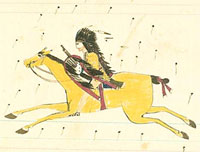
 |
Ethno::log |
|
Dept. of cyberethnologica, zephyrin, May 11, 2004 at 1:56:37 PM CEST
Nerd
HOUTMAN, GUSTAAF AND DAVID ZEITLYN. 1996. Information technology and anthropology, Anthropology Today 12(3): 1-3. ... Link (0 comments) ... Comment Dept. of cyberethnologica, praying mantis, May 1, 2004 at 8:11:10 PM CEST The Presentation of Archetype and Cultural Values in MMORPGs I found this work on the internet. I haven't read it yet but I thought the titel sounds very interesting. Please feel free to comment. I'd like to know wether I should read it. =) ... Link (1 comment) ... Comment Dept. of cyberethnologica, zephyrin, April 15, 2004 at 5:38:21 PM CEST Internet studies Timothy J. Hickey, associate professor of computer science and one of the key pioneers of the new program, said the main benefit of Internet studies will be that it will allow students to think more critically about Internet-related issues since they will have developed a solid understanding of the Internet from related disciplines, including computer science, legal studies, economics, anthropology, literature and fine arts. For example, Hickey explains that the Napster phenomenon can be viewed as one of many examples of peer-to-peer computing technology, or as a challenge to and popular reinterpretation of Intellectual Property law. This phenomenon can be seen as a social phenomenon with its own culture, or as harbinger of the emerging online entertainment industry, or as the beginning of a new social contract between artists and their public. "Each of these views is strengthened by a deeper understanding of the other views, and any single viewpoint alone is clearly missing important aspects of the phenomenon," Hickey said. via Brandeis Reporter 18(6) 2001 ... Link (0 comments) ... Comment Dept. of cyberethnologica, zephyrin, April 15, 2004 at 3:20:35 PM CEST Psychology and the internet The study Psychology and the internet: A basic psychological study on the Internet Relay Chat phenomenon by Gloria Dabiri & Dörte Helten is completely online (as html and pdf, both identical and in german). This goes well with Psychology of cyberspace. Thanks to praying mantis ... Link (1 comment) ... Comment Dept. of cyberethnologica, zephyrin, April 15, 2004 at 3:09:22 PM CEST TouchGraph TouchGraph offers tools for information visualization, namely for mapping relations between weblogs, websites and more. Check out their news section to get an idea to which uses the tools can be put. See our older story map of the internet, too. ... Link (0 comments) ... Comment Dept. of cyberethnologica, zephyrin, April 15, 2004 at 11:33:47 AM CEST Free/Libre/Open Source Software: Policy Support
... Link (0 comments) ... Comment Dept. of cyberethnologica, zephyrin, April 14, 2004 at 5:31:02 PM CEST Academic Blogging is a Must tech ronin writes the truth: "All of a sudden there's this revolutionary possibility that we can get a ten-fold increase in communication around all this, and we turn it down for small-minded reasons? OK, maybe everyone isn't meant to be a blogger but academics seem like naturals. [...] I suspect that academia might become borderline irrelevant or even somewhat obsolete if its academicians stay cloistered away with their academic journals. Don't get me wrong, this is a very good topic and worth further exploration of all sides of the issue. I'm just coming down hard on the side of academic blogging. We need you." See additionally "Personal knowledge publishing and its uses in research" by Sébastian Paquet in English or French. My usual two cents: Furthermore weblogs are an invaluable opportunity for social/cultural anthropologists who do participant observation among online communities. By means of a weblog the fieldnotes, the field-diary, or parts of it, can immediately made accessible to the members of the observed community. Reactions and comments can be gathered while the participant observation is still under way, and afterwards of course, too. A demand which resulted from the discourse on fieldwork, but more often than not could not be realized. via many2many ... Link (1 comment) ... Comment Dept. of cyberethnologica, zephyrin, April 14, 2004 at 3:42:04 PM CEST Free Culture Finally I made it to start to read Lawrence Lessig's new book Free Culture. The only thing I can say is: GO AND GET IT!. Additionally have a look at the comments and insights on it, which Bryan Alexander provides at Infocult (Scroll down and/or search -- updates on the matter come regularly). ... Link (0 comments) ... Comment Dept. of cyberethnologica, zephyrin, April 14, 2004 at 1:21:03 PM CEST Scambaiters "This is really a very interesting adoption of culture, isn't it?" -- that was Kerleone's comment on the Nigeria Connection (See our older stories.) back in 2002. The advance fee fraud scheme (that has been in existence through regular postal mail for more than 20 years) via e-mail now is internationally known as 419 Scam -- so named after Nr. 419 of Chapter 38 of the Nigerian Criminal Code Act which applies to it. As we reported, the problems with those frauds from Nigeria, which exist since about 1989, grew bigger, the conmen scored big wins and serious incidents have taken place: People who have been lured to Nigeria have been abducted or even murdered. Police forces all over the world go for lengths to fight the scammers: "In one month alone, in the summer of 1995, [U.S. Secret Service] agents extricated seven U.S. victims from Nigeria, though one American was murdered [...]" Apart from this dramatic 'real-life' efforts authorities and others have public education material about 419 online. Nevertheless, maybe due to the nature of the internet or humanity itself, the scamming goes on. P.T. Barnum once complained: "You can't cheat an honest man." -- at other times this saying is attributed to the king of con-men, Joseph R. "The Yellow Kid" Weil. By that logic, if a greedy person is a good target, a professional con-man makes the best "mark", or "mugu", to use the Nigerian scammers' own term, of all. Consequently this 'adoption of culture' has been adopted itself, the scammers have new enemies who entangle them into a complex play of tricksterish reality-satire, deception, and counter-deception, the scambaiters: "Baiting a scammer involves replying to the emails with the knowledge it is all a scam. Often the scammer will think you are a real victim and try their best to extract money." There are different reasons for scambaiting, some want to create amusing stories, others want to educate the public, and some even want to reverse the scam and receive a few token dollars. The hilarious results can be viewed online. Initially via c't 8/2004 ... Link (0 comments) ... Comment Dept. of cyberethnologica, zephyrin, April 8, 2004 at 12:54:53 PM CEST Anthropologists studying corporate informatics
... Link (0 comments) ... Comment Dept. of cyberethnologica, kerleone, February 20, 2004 at 10:46:18 AM CET Kiowa Art and Illustrations from the 1870s  "The Smithsonian’s collections of Kiowa drawings include works of art on buffalo hide and more recent examples on paper, a medium that Kiowa artists adopted after it became widely available in the late nineteenth century. Together, these drawings offer a unique source of information on tribal social and artistic traditions."
This is really a huge collection. Also of interest are the anthropological illustrations, which kiowa people made for fieldworker James Mooney.
Via Cartoonist
"The Smithsonian’s collections of Kiowa drawings include works of art on buffalo hide and more recent examples on paper, a medium that Kiowa artists adopted after it became widely available in the late nineteenth century. Together, these drawings offer a unique source of information on tribal social and artistic traditions."
This is really a huge collection. Also of interest are the anthropological illustrations, which kiowa people made for fieldworker James Mooney.
Via Cartoonist
... Link (0 comments) ... Comment Dept. of cyberethnologica, kerleone, February 19, 2004 at 1:05:43 PM CET Identity in Cyberspace The two german Anthroplogists Ina Zukrigl and Joana Breidenbach show in their article about identity in "virtual worlds" six thoughts about the differences between online and offline: Vernetzte Welten - Identitäten im Internet Via Ethno Info ... Link (0 comments) ... Comment |
The finest stuff from ethnology social/cultural anthropology and cyberanthropology. Collected with ceaseless endeavour by students and staff of the Institut für Ethnologie in München/Germany and countless others.
... about this website Online for 8942 days Last modified: 11/29/22, 8:56 PM Search
Browse by Category
Status
Youre not logged in ... Login
Menu
Calendar
Recent updates
Schade Oh, so bad! The
oldest anthropology blog is closing :(( It seems the whole...
by iglu01 (1/4/20, 4:05 PM)
-- Closed -- I think
it's time to close the weblog, it's already sleeping since...
by kerleone (12/29/19, 1:54 PM)
Stellenausschreibung des Max-Planck-Instituts für ethnologische
Forschung. Bewerbungsfrist: 15.02.2017 Das Max-Planck-Institut für ethnologische Forschung sucht Doktoranden/Doktorandinnen...
by HatEl (1/31/17, 9:11 AM)
Ethnosymposium in Halle (Saale): Call
for Contribution – 14.-17. Mai 2015 Call for Contribution –...
by normanschraepel (2/9/15, 3:35 PM)
Bruno Latour: Kosmokoloss. Eine Tragikomödie
über das Klima Der Hörspiel Pool von Bayern 2 hat...
by pietzler (11/21/14, 3:23 PM)
Send us suggestions
|
||||||||||||||||||||||||||||||||||||||||||||||||||||||||